Keto and Dairy: Essential Guidance on Choices and Substitutes
This post may contain affiliate links. If you purchase through these links, I may earn a small commission at no extra cost to you. LEARN MORE.
The keto diet has gained popularity for its high-fat, low-carb approach to weight loss and health improvements. Understanding which foods fit into this lifestyle can be tricky, especially when it comes to dairy.
Dairy is often a common choice due to its high fat content, but not all dairy products are created equal on the keto diet.
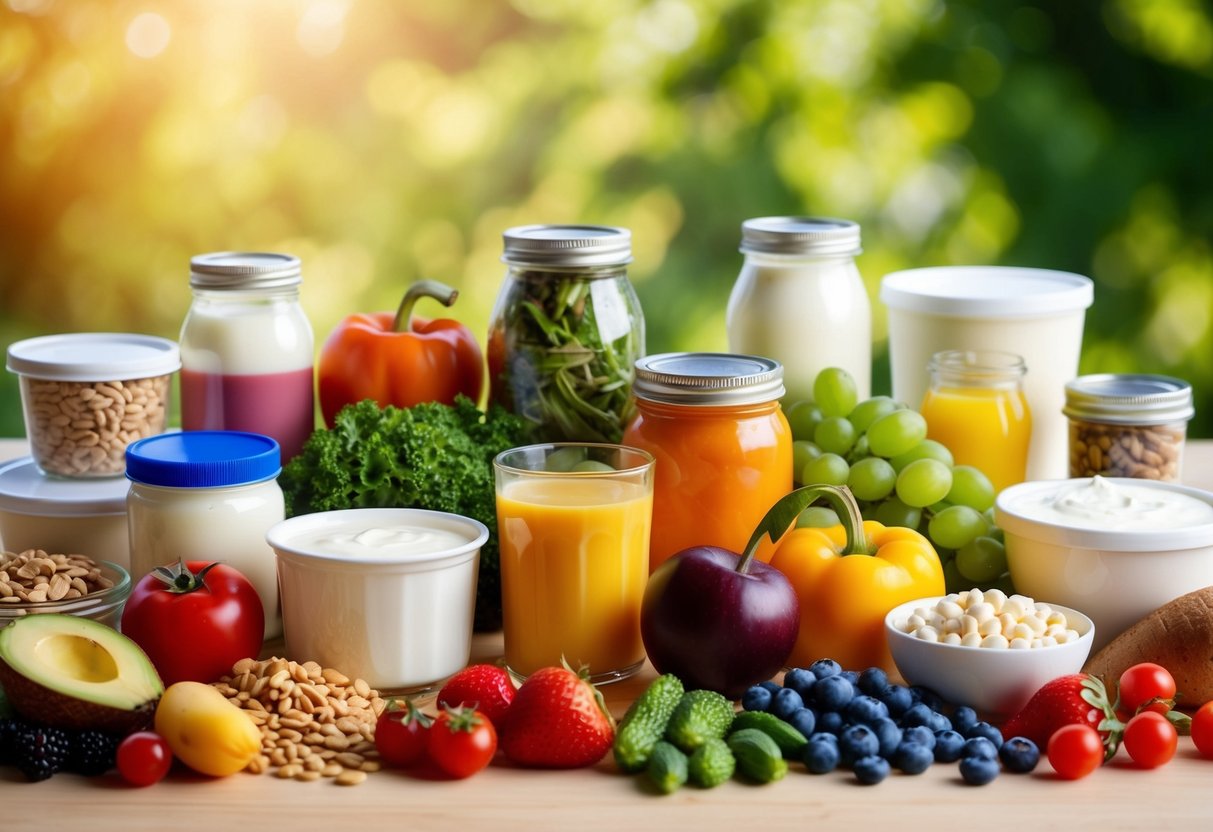
Most cheeses, butter, and heavy cream work well for those on keto since they are low in carbs and rich in fats. However, some dairy products, like milk and flavored yogurts, can be higher in carbs and should be limited or replaced with suitable alternatives.
This post will guide you through making smart dairy choices that fit your keto lifestyle.
Exploring which dairy options to eat, avoid, and replace on a keto diet can simplify your food choices and maximize your health benefits.
With the right knowledge, dairy can become a valuable part of your keto journey, helping you enjoy delicious meals without compromising your dietary goals.
New to keto diet? Read our guide on Keto Diet for Beginners: Easy Tips to Kickstart Your Journey.
Ready to transform your health with a custom meal plan? Try the Custom Keto Diet tailored to your body, goals, and lifestyle.
Key Takeaways
- Cheese, butter, and heavy cream are keto-friendly dairy options.
- Milk and flavored yogurts may need to be limited or replaced.
- Smart dairy choices can support a successful keto diet.
Understanding the Keto Diet
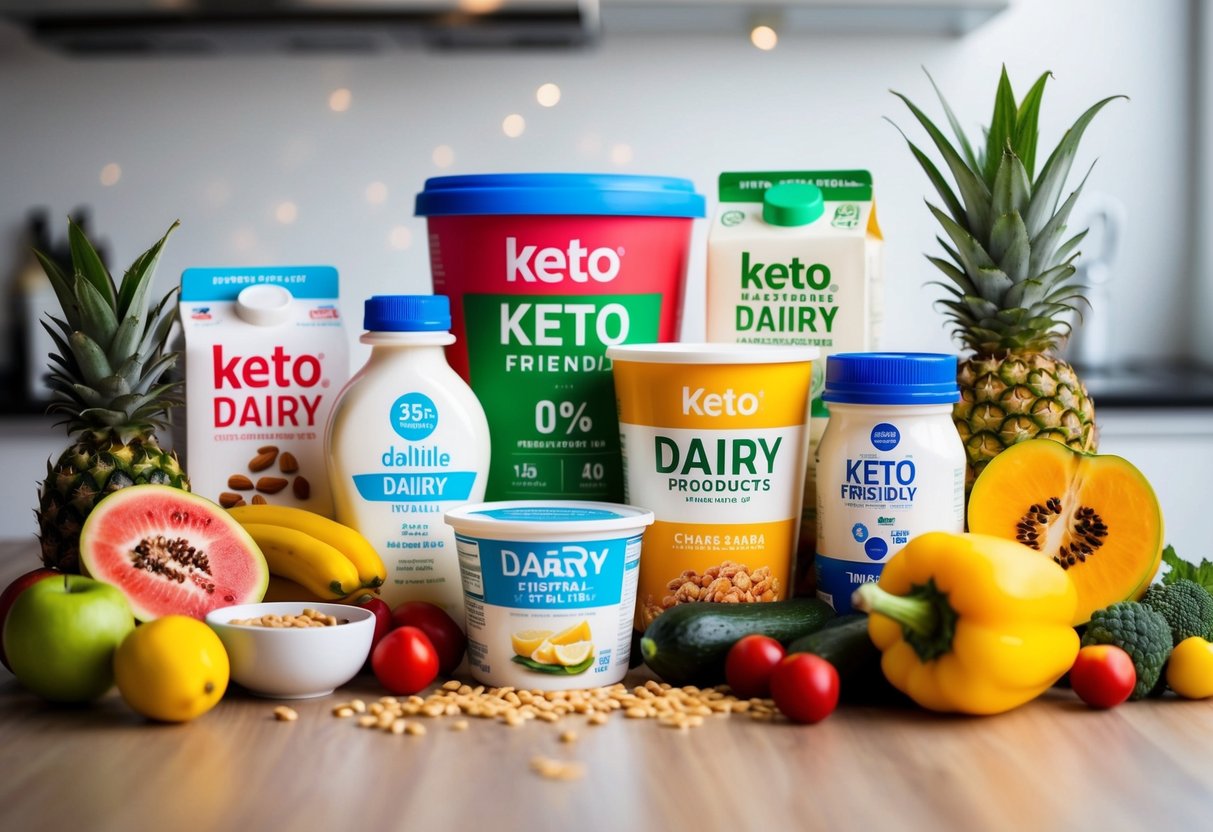
The ketogenic diet focuses on low carbohydrates and high fats. This dietary plan helps the body enter a state called ketosis, providing several potential health benefits such as weight loss and improved blood sugar control.
Ketogenic Diet Basics
The keto diet requires a significant reduction in carbohydrate intake, often limiting it to about 20-50 grams of net carbs per day.
Instead, the diet emphasizes consuming high amounts of fats and moderate proteins.
Foods typically encouraged include meats, fish, eggs, butter, oils, and low-carb vegetables.
By shifting the body’s primary energy source from carbohydrates to fats, the diet aims to help manage insulin levels and improve insulin sensitivity, which may benefit those with type 2 diabetes.
Many people follow the diet for weight loss, while others are interested in its potential impacts on heart health and cholesterol.
Despite varying results, some studies suggest improvements in cholesterol levels and reduced triglycerides, which may contribute to heart health.
The Role of Ketosis in Weight Loss
In ketosis, the body switches its fuel source from glucose to fats, breaking them down into ketones. This metabolic state encourages the body to burn stored fat, leading to potential weight loss.
Ketosis begins when there is a significant drop in blood sugar levels, leading to decreased insulin levels. The reduced insulin levels help in fat breakdown as well.
Ketone levels in the blood increase, providing a consistent energy supply that might benefit brain function and even reduce symptoms in epilepsy for some individuals.
While in this state, individuals may experience reduced hunger, making it easier to stick to the diet.
There is ongoing research into how ketosis could play a role in managing health conditions such as heart disease and certain types of cancer.
Learn how intermittent fasting complements keto for faster results, check out our guide on How Intermittent Fasting Works with Keto to Accelerate Fat Loss.
Is Dairy Keto-Friendly?
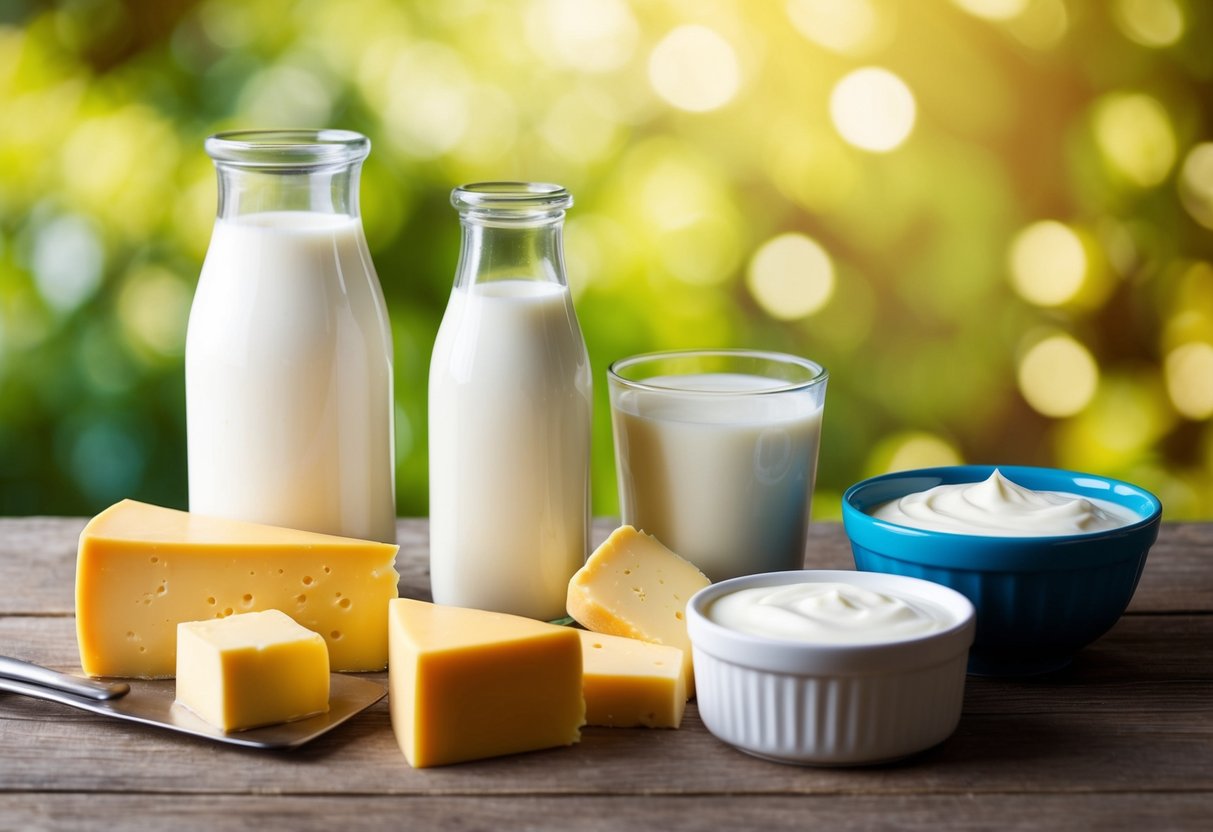
Dairy can be a valuable component of a ketogenic diet, providing essential nutrients such as calcium and protein while offering high-fat content. Certain factors such as lactose sensitivity and hormonal effects might make some people reconsider their dairy intake.
Nutritional Benefits of Dairy on Keto
Dairy products like cheese, butter, and cream are rich in high-fat content, which is ideal for maintaining ketosis. They also provide calcium and protein, which help with bone health and muscle maintenance, respectively.
Some dairy items contain unsaturated fats, contributing to heart health. Cheese and yogurt offer beneficial probiotics that support digestion.
These nutritional benefits make dairy a practical option for many people on a keto diet.
Hormones, Inflammation & Lactose Sensitivity
Hormones in some dairy can affect individuals differently, potentially leading to an inflammatory response in some cases.
Lactose intolerance is another consideration since many dairy products contain lactose, which can cause digestive issues for some people.
Lactose-sensitive individuals can opt for hard cheeses or lactose-free products that are easier to digest.
Paying attention to one’s body’s responses to dairy can help determine the best choices.
Avoid these common keto mistakes that could kick you out of ketosis.
Who Should Limit or Avoid Dairy?
People with severe lactose intolerance, dairy allergies, or specific hormonal concerns may need to avoid dairy products entirely.
Inflammatory conditions could worsen with dairy intake, so these individuals should be cautious.
There are alternatives like almond milk, coconut milk, and other dairy-free options that still align with a ketogenic lifestyle.
Making educated choices can help individuals enjoy the benefits of keto without the side effects of unwanted dairy reactions.
Best Keto-Approved Dairy Products
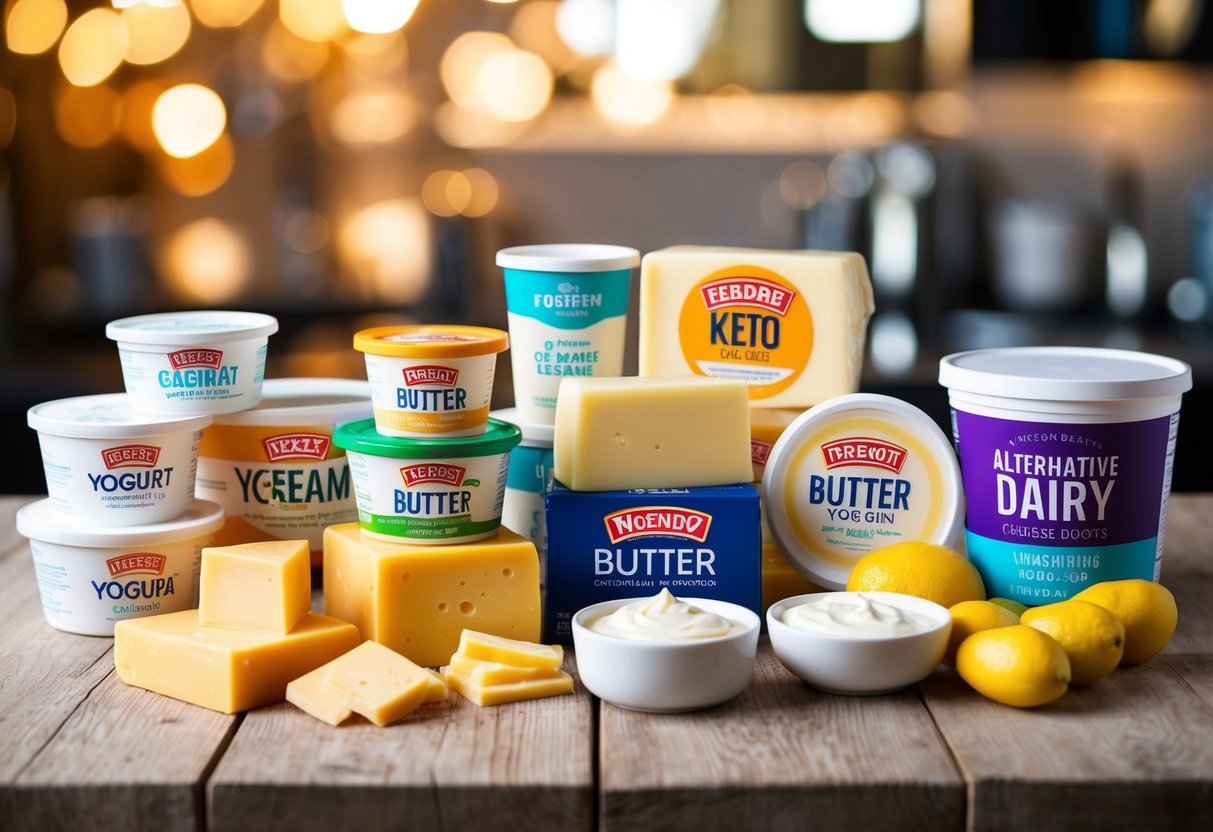
Incorporating the right dairy products can make a big difference on a keto diet. These choices are both low in carbohydrates and rich in healthy fats, ensuring you stay on track.
Low-Carb Cheeses
Cheese is a favorite among those following keto for its taste and low-carb content.
Cheddar, mozzarella, and Brie are excellent options. They’re rich in flavor and offer varying levels of creaminess.
Most cheeses have minimal carbs, making them ideal for a keto regimen. Parmesan is another great choice, adding a sharp taste to dishes.
Always check labels to keep track of carb content, though many cheeses are naturally low in sugars.
High-Fat Options
Butter and cream are staples in a keto diet due to their high-fat content.
Grass-fed butter is preferred for its omega-3 acids. Heavy cream provides richness to recipes, perfect for sauces and coffees.
Ghee, a type of clarified butter, is also favored for its nutty taste.
Fermented & Probiotic Dairy
Including fermented options like Greek yogurt and kefir can offer probiotic benefits, aiding digestion.
Opt for full-fat Greek yogurt and ensure kefir is unsweetened to keep carbs down.
Sour cream is another choice, bringing a tangy flavor with probiotic potential.
These selections can support gut health, which is often a focus for those prioritizing overall wellness alongside keto objectives.
For more detail about keto and gut health, read our article on Keto and Gut Health: Unlock Microbiome Secrets for Optimal Weight Loss & Boosted Energy.
Keto Dairy Alternatives
For those avoiding traditional dairy, nut milk and coconut milk serve as substitutes.
Nut milks like almond milk should be unsweetened to ensure they remain low in carbs.
Coconut oil can replace butter in some recipes, offering healthy fats while keeping flavors intact.
These alternatives make it easier for those with dairy sensitivities to maintain their keto lifestyle, delivering versatility and nutritional benefits.
Check out our ultimate keto food list for keto diet for more detail.
Dairy to Limit or Replace on Keto
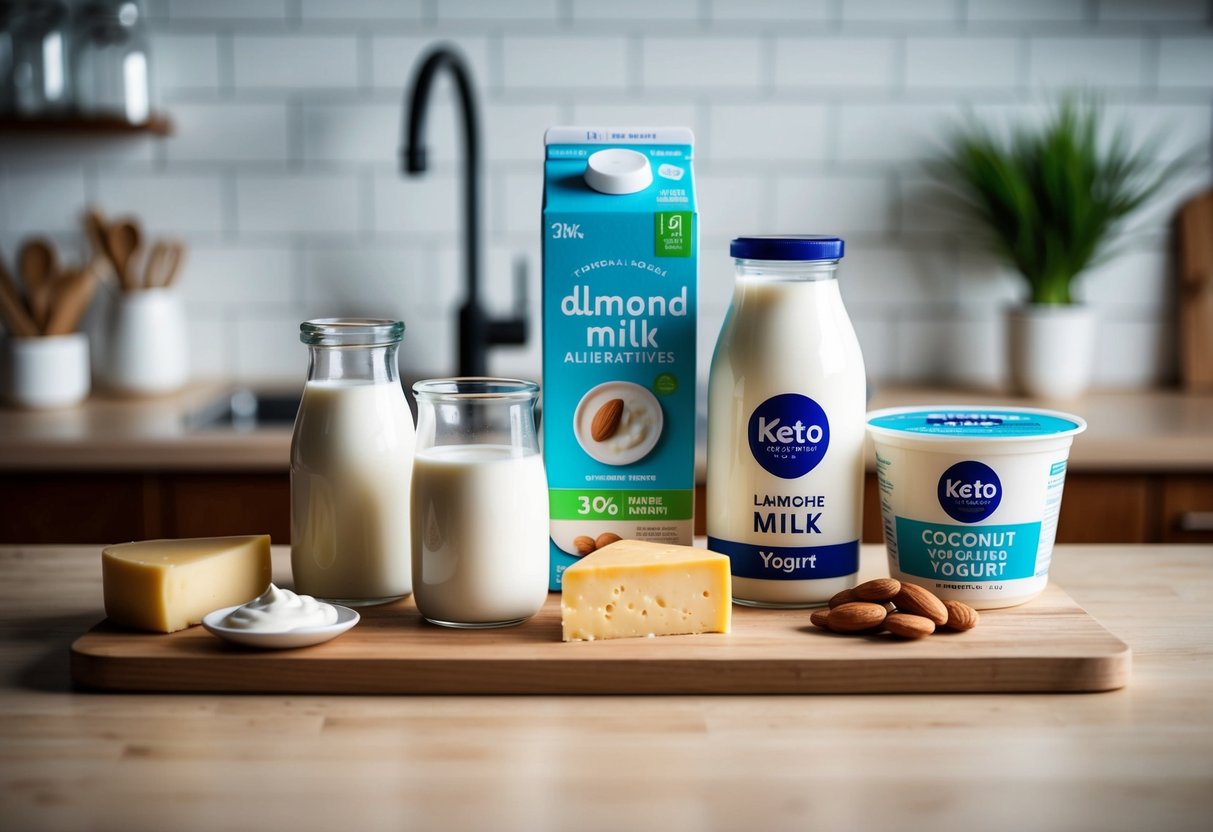
Sticking to a keto diet means choosing foods that are low in carbs and high in fats. While many dairy products fit well in this diet, some need to be limited or replaced.
Ensuring that the selected dairy products align with these needs can help in maintaining ketosis.
Milk and High-Lactose Dairy
Milk contains a significant amount of lactose, a natural sugar. This can raise carb intake quickly. A single cup of milk has around 12 grams of carbs, making it less ideal for a keto diet.
High-lactose dairy, like flavored yogurt, should be limited as well.
Alternatives like almond milk or coconut milk offer a low-carb option. They provide similar textures without the high lactose content.
For those seeking nutrient-dense options, these substitutes can fit seamlessly into recipes or be enjoyed on their own.
Low-Fat or Sweetened Dairy Products
Low-fat dairy products often have added sugars to enhance flavor, leading to higher carb counts.
Sweetened yogurts, in particular, can pack more carbs than expected.
Full-fat dairy, such as whole milk yogurt, is typically a better choice for keto followers due to its higher fat content.
Incorporating options like full-fat Greek yogurt or unsweetened kinds can help maintain the desired macronutrient ratio in a high-fat diet.
These products not only lower carb intake but also add a creamy texture to meals and snacks.
Get our beginner-friendly 7-day keto meal plan to start strong.
Common Hidden Carbs in Dairy
Carbs can sneak into dairy products unexpectedly. Ingredients like modified food starch and sweeteners are often added to thicken or sweeten without obvious labeling.
Processed cheeses and cream-based soups may contain more carbs than one would assume.
Simple steps such as selecting real cheese over processed versions or opting for homemade soups can help reduce hidden sugars.
To personalize your own keto meal, try out Custom Keto Diet to assist you with meal plan.
Smart Replacements on Keto and Dairy
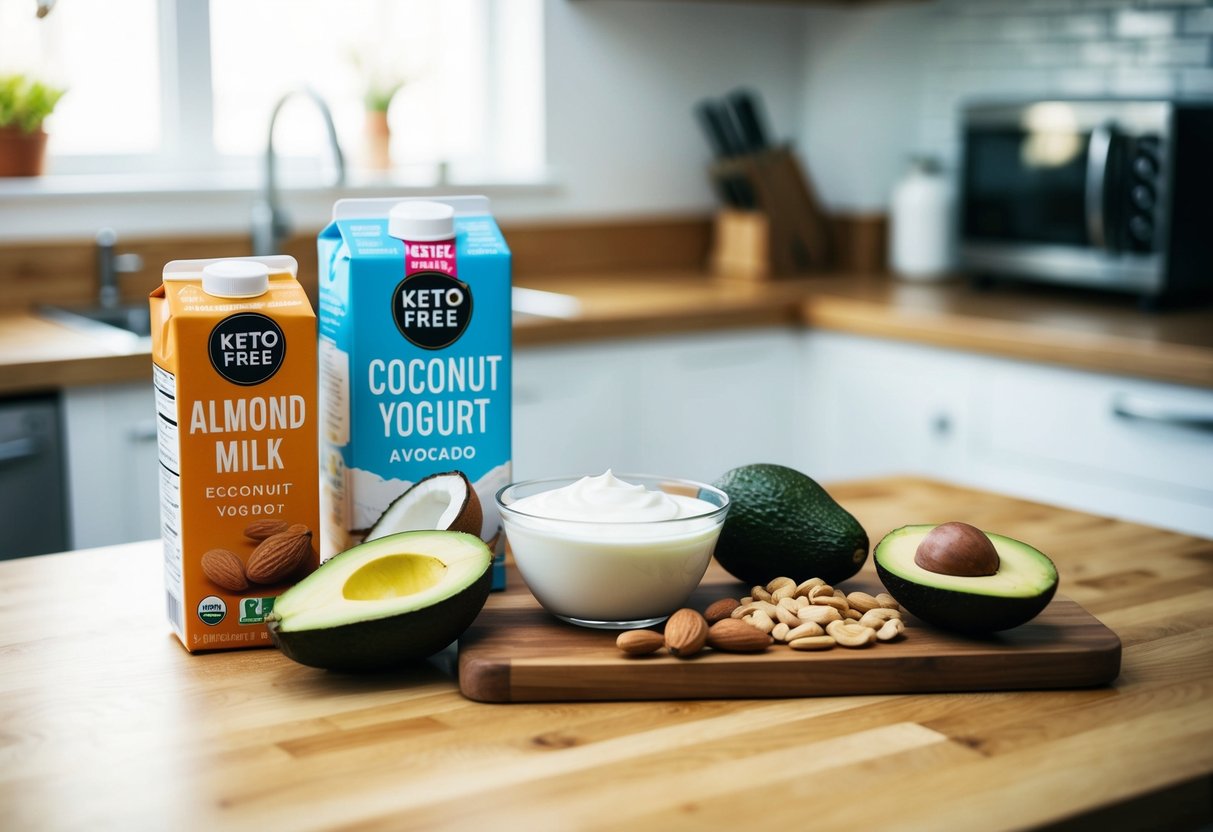
Finding the right dairy replacements is important for those on a keto diet who need or choose to avoid dairy. Suitable alternatives help maintain low carbohydrate intake and support health goals.
Best Dairy-Free Milks
Almond milk is a popular choice, providing a low-calorie, low-carb option. It adds creaminess without raising blood sugar levels.
Coconut milk is another good choice. It has healthy fats, which are ideal for a keto diet. It’s creamy and quite versatile in cooking and baking.
Macadamia milk is less common but valued for its rich, buttery taste. It’s high in fats and low in carbohydrates, making it a perfect match for keto nutrition requirements.
Non-Dairy Cheeses and Creamers
Cheese lovers can explore various non-dairy options made from nuts or soy. These can mimic the texture and taste of traditional cheeses.
Nutritional yeast is also popular. It provides a cheesy flavor and is rich in B-vitamins.
Some brands even add minerals like magnesium, supporting those concerned about nutrient deficiencies on keto.
For coffee, coconut and almond-based creamers are ideal. They are keto-friendly, offering creaminess without added sugars or carbs.
Addressing Keto Diet Challenges
Sticking to a keto-friendly diet means managing protein and carbohydrate intake carefully. Smart dairy replacements help deal with challenges like the “keto flu,” which occurs when transitioning into ketosis.
Replacing dairy with alternatives like low-carb vegetables or nutrient-rich salad greens can aid digestion with added fiber while keeping carbohydrate intake in check.
Ensuring enough healthy fats and balanced nutrients from non-dairy sources can help control blood pressure and support overall well-being.
Using these alternatives can contribute positively to maintaining keto health goals.
To overcome keto flu, follow our guide on Keto Flu Symptoms and How to Overcome Them Fast.
Frequently Asked Questions
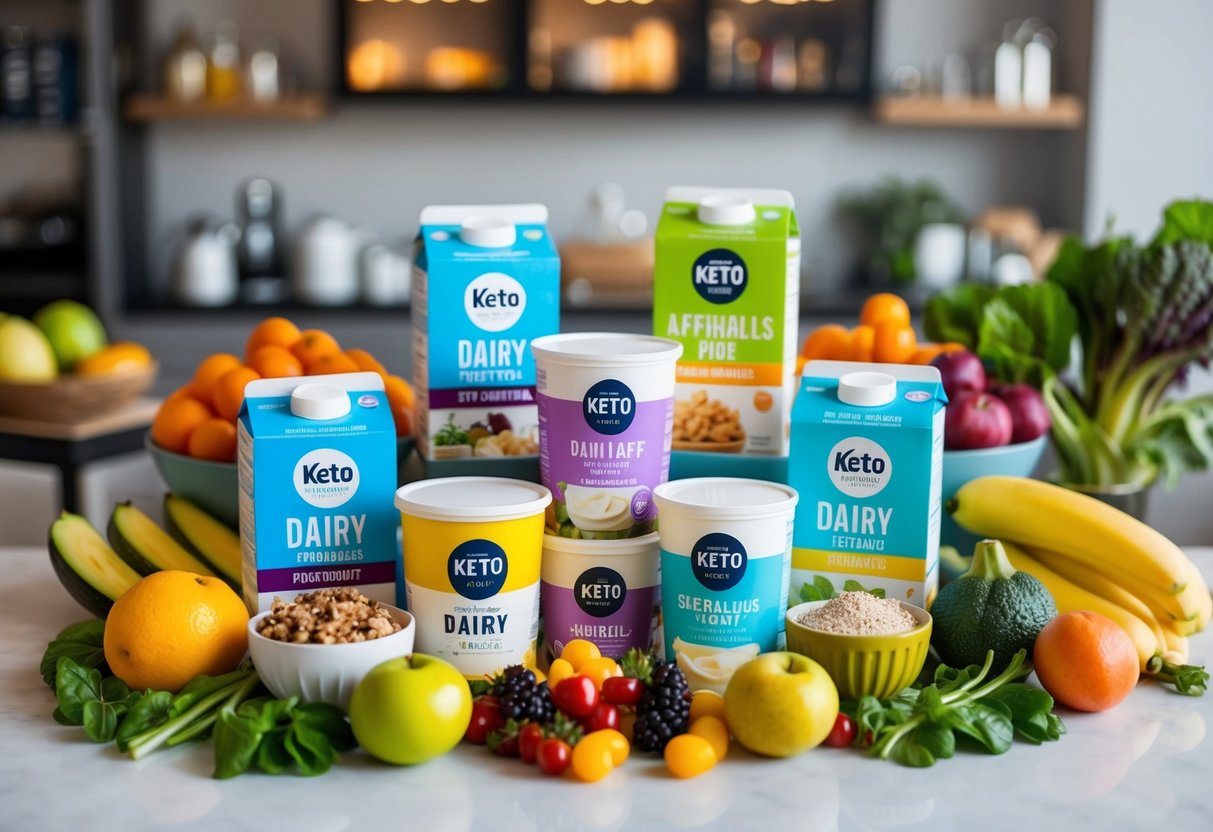
When following a ketogenic diet, understanding which dairy options are beneficial and which to avoid can enhance the diet’s success.
This also includes knowing the right substitutes and essential foods for maintaining a balanced keto lifestyle.
What are the best dairy alternatives compatible with a ketogenic diet?
Almond milk and coconut milk are popular choices due to their low-carb content.
Unsweetened versions are best for keeping carb intake low.
Other options include nut-based cheeses and yogurt made from coconut milk. Ensuring they are full-fat variants helps meet dietary fat needs.
How can I ensure sufficient fat intake on keto if I choose to avoid dairy?
Incorporate healthy fats like avocados, olives, and nuts.
Cooking with oils such as olive oil, coconut oil, or avocado oil is beneficial.
Including fatty fish like salmon can boost fat intake effectively.
Are there specific dairy products that should be avoided on a ketogenic diet?
Dairy products high in sugar and carbs, such as sweetened yogurt and milk, should be limited.
Low-fat versions often contain added sugars. Keeping an eye on these helps maintain ketosis.
Which foods are essential to include in a beginner’s keto diet plan?
Key staples include meat, eggs, and healthy fats like avocado.
Leafy greens and low-carb vegetables are important.
Incorporating a variety of nuts and seeds can provide needed nutrients and healthy fats.
Can you provide a list of vegetables that are not recommended for a keto diet?
Starchy vegetables like potatoes and corn should be avoided as they are high in carbs.
Peas and carrots also contain more carbs than preferred, making them less suitable for a strict keto diet.
What are the top high-fat foods to consume on a ketogenic diet?
Foods like fatty cuts of meat, avocados, and nuts are excellent choices.
Cheese and eggs also provide a good amount of fat. Eating fish like salmon provides beneficial omega-3 fatty acids as well.
Explore the best keto-friendly supplements to support your fat-burning journey.
Conclusion
Dairy can play a significant role in a keto diet, providing both flavor and nutrition.
Best Dairy Options:
- Cheese
- Plain yogurt
- Cottage cheese
- Cream
These options are low in carbohydrates and fit well within the keto guidelines.
Some dairy products, like milk and flavored yogurt, should be avoided due to high lactose content. These can increase carbohydrate intake, affecting ketosis.
Dairy Alternatives:
- Almond cheese
- Coconut milk
- Dairy-free creamers
These substitutes can be useful for those sensitive to dairy or seeking variety.
It’s important to focus on high-fat, low-carb dairy to achieve keto goals. Balancing dairy intake with other food choices helps maintain an effective ketogenic diet.
Transform your health today—start your personalized journey with our Custom Keto Diet program and see what keto can do for you!
